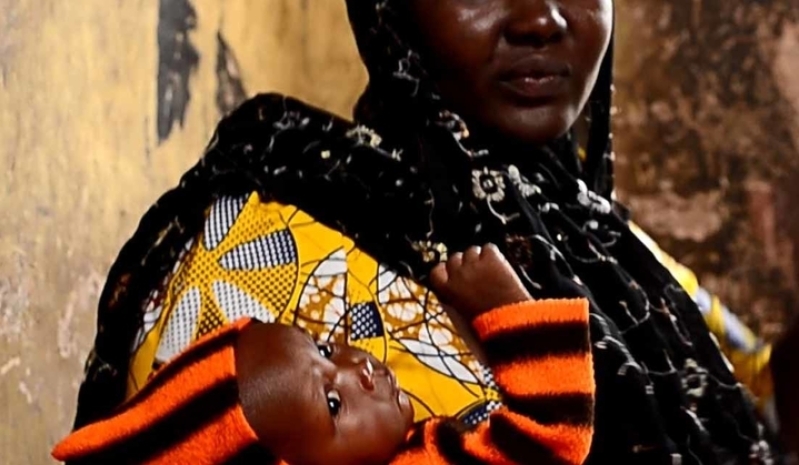
A Christian teen who was raped and forced to carry the child of a Boko Haram fighter in Nigeria has shared how God redeemed her tragedy to bring about blessing.
Esther, from the West African town of Gwoza in southern Borno State, was among several young women kidnapped by the Islamic extremist group Boko Haram (which translates "non-Islamic education is a sin") in 2015.
The young woman, who was just 17 at the time of her abduction, told persecution watchdog Open Doors USA that life under the terrorist group was full of unspeakable horrors. The terrorists employed diverse tactics to coerce the kidnapped girls to renounce their faith in Christ and swear their allegiance to Allah, the Muslim God.
When enticement with privileges didn't work, the terrorists resorted to violence.
"I cannot count how many men raped me," she told Open Doors. "Every time they came back from their attacks, they would rape us... defile us...Each passing day, I hated myself more and more."
"I felt that God had forsaken me," she continued. "There were times when I was so angry with Him ... Still, I could not get myself to renounce Him. I found myself remembering His promise to never leave me or forsake me."
Eventually, Esther became pregnant at the hands of one of her rapists.
"I had no idea how on earth I would ever be able to love this child," she says, remembering how she felt when she learned she was pregnant.
In November 2016, the Nigerian military rescued Esther and the other kidnapped girls in captivity. Upon returning home, Esther hoped to support and encouragement after her harrowing experience. Instead, she was rejected and shunned by many in her community and labeled a "Boko Haram woman."
"They mocked me because I was pregnant," she says. "Even my grandparents despised me and called me names. I cried many tears. I felt so lonely."
Despite her sorrow, Esther named her daughter Rebecca, who she said gave her "joy and laughter amid sadness."
"What broke my heart, even more, was that they refused to call my daughter Rebecca," she said. "They referred to her only as 'Boko.'"
During this time, Esther connected with Open Doors. Ministry leaders encouraged her to trust God with her future and put her brokenness at the foot of the cross. To physically demonstrate this, the young woman was encouraged to write the burdens of her heart on a piece of paper and then pin that paper to a hand-carved cross in the room.
"When I pinned that piece of paper to the cross, it felt like I was handing over all of my sorrow to God," Esther said. "When the trainer later removed all the pieces of paper from the cross and burnt them to ashes, I felt like my sorrow and shame disappeared, never to come back again."
A year after her return to her village, people still struggled to accept Esther and her daughter - but the young mother said she is now at peace with herself and what happened to her.
"People have noticed a change," she says. "Some of those people who used to mock me now ask me my secret. I tell them, 'I forgave my enemies and now trust God to take vengeance in His time.'"
A 2016 report from International Alert, a peace-building group, and UNICEF found that over 2,000 women and children, both girls and boys, have been abducted by Boko Haram since 2012.
The report, titled "Bad Blood: Perceptions of children born of conflict-related sexual violence and women and girls associated with Boko Haram in northeast Nigeria," notes that while in captivity, many of the women were raped and forced to marry militants.
As military forces reclaimed land captured by the jihadist group, hundreds of women and girls have been released from captivity, said the study. However, the women often face overwhelming rejection and persecution.
"As they return, many face marginalization, discrimination and rejection by family and community members due to social and cultural norms related to sexual violence," the report says.
"There is also growing fear that some of these girls and women were radicalized in captivity. The children who have been born of sexual violence are at an even greater risk of rejection, abandonment and violence."
The report notes that some of the women who have been released are pregnant or have given birth to children whose fathers are Boko Haram fighters. Community members told researchers that the there is widespread fear the children have "bad blood" transmitted from their fathers.
Last week, Boko Haram kidnapped 110 schoolgirls in at a girls' school in the town of Dapachi.
President Muhammadu Buhari, who has declared Boko Haram defeated on a number of occasions since coming to power in 2015, described the situation as a "national disaster."
"I want the families of the girls yet unaccounted for at the Government Girls Technical College, Dapchi to know that no effort will be spared to ensure that all of them are returned safely, and the attackers arrested and made to face justice," Buhari vowed in a message on Twitter.
"The entire country stands as one with the families, and with the government and people of Yobe State. This is a national disaster. We are sorry that it happened; we share your pain," the president added.
"Let me assure that our gallant armed forces will locate and safely return all the missing girls."






